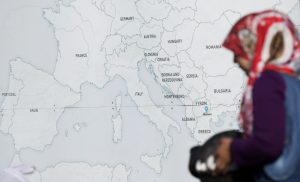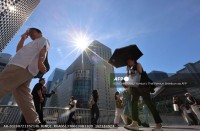
Some 54,000 people, many of them fleeing the war in Syria, have been stranded on Greek territory since the closure of the migrant route through the Balkans in February. / AFP / TOBIAS SCHWARZ
BRUSSELS, Belgium – AFP
The EU is set this week to allow countries to extend border controls in the passport-free Schengen area as a result of the migrant crisis and recent terror attacks following a request by five countries, European sources said Monday.
Germany, France, Austria, Denmark and Sweden wrote to the European Commission saying the border situation remains “extremely volatile” and asking them to prolong their right to keep frontier checks.
“We have a decision ready for Wednesday,” a spokeswoman for the Commission, the executive arm of the EU, told AFP when asked when it was due to rule on the request.
European sources said the Commission was set to approve the measure in line with its so-called “roadmap” for the restoration of the normal functioning of Schengen “by the end of the year.”
Since 2015 several countries in the 26-nation Schengen zone have reintroduced border controls — scrapped more than a decade ago — in the face of a record number of migrants and refugees coming to Europe.
EU rules say countries can reintroduce border controls for up to two years, in periods of up to six months at a time, in exceptional circumstances when the bloc’s frontiers are under threat.
The Commission is set to rule that that is the case on the Greek-Turkish border despite what Brussels last week called “incredible” efforts by Athens to stem the flow of migrants.
The letter from the five countries, a copy of which was obtained by AFP, says that a “considerable number of migrants are still in Greece and along the Balkan route.
“In general, the situation is extremely volatile and difficult to predict all the more so the central Mediterranean route (from North Africa to Italy) remains another cause of concern,” it says.
“From our point of view, this threatens the functioning of the Schengen area without internal border controls and generally constitutes a serious risk for public order and security.”
The Paris and Brussels attacks meanwhile “demonstrated that terrorist groups are likely to try and take advantage of deficiencies in border controls.”
Greece has rejected any attempt to turn it into what it calls a “warehouse of souls” for the bulk of refugees in Europe by closing off borders.
In a major effort to tackle the migration crisis the EU in March signed a deal with Turkey under which it agreed to take back all migrants arriving in Europe, so long as Europe resettles one Syrian refugee for every Syrian that is sent back to Turkey.
Migrants still have the right to apply for asylum but after the EU declared Turkey a “safe country” in practice almost all can be sent back.
For its part Turkey extracted promises of visa free travel, billions in aid and faster EU membership from Brussels.







